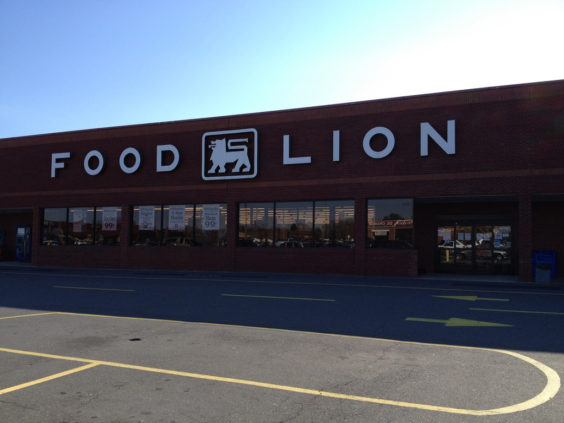What’s not to like about low prices on the things you buy most often at the grocery store? Apparently Food Lion customers found plenty not to like. The grocery chain is ending an “everyday low pricing” test and raising prices – so it can have more sales instead.
The East Coast chain, one of the largest in the country, has been working to refresh its stores and lower prices. But it admitted today that it may have lowered some prices a little too much.
Back in October, Food Lion slashed prices significantly in its dairy and frozen food sections. The idea was to test whether customers liked everyday low prices better than the traditional high-low pricing, in which items have a higher shelf price but often go on sale for much less.
It didn’t work. The test “has not been compelling and will not be extended,” said Pierre Bruno Charles Bouchut, the Chief Financial Officer of Food Lion’s Belgian-based parent company, Delhaize.
“We lowered our shelf pricing and used a lot less promotion,” added Roland Smith, the U.S.-based CEO of Delhaize America. “We saw some nice customer response,” but “not to the level that we were hoping for.”
So does that mean customers actually like higher prices? Couponers certainly prefer high-low pricing. If you hold onto your coupons until an item is on sale, you can get it at its rock-bottom price. But if the item has an “everyday low price”, which falls somewhere between the highest and lowest possible price, you’re not going to save as much.
To stores, though, the main potential drawback of everyday low pricing is that there’s nothing to promote, other than the promise of low prices. You can’t fill a sales circular with sale prices if nothing’s on sale. It works for Walmart, but grocery stores have never seemed to be able to settle on a consistent strategy.
In Milwaukee, for instance, Pick ‘n Save is currently testing an everyday low pricing strategy to better compete with Walmart (read: “Supermarket Surrenders to the Walmart Challenge”). Kroger has rolled out “new lower prices” in two regions, one of which no longer offers double coupons as a result (read: “Kroger Offers New Lower Prices! Oh, And No More Double Coupons”). And a recent study confidently predicted that nearly everyone would offer everyday low pricing within the next few years (read: “Pundits Predict Lower Grocery Prices”).
But Food Lion’s move bucks that trend. And another grocery chain, based clear on the other side of the country, is probably not surprised. “Historically, in this business, competitors indicate that they’re going to invest this massive amount of money in pricing,” Safeway President Robert Edwards said yesterday. “But in reality, it doesn’t happen that regularly or consistently, or for an extended period. They may announce something and actually do a bit of that for a short period of time but then quickly come back.” And plenty of studies, and history, show that he’s right (read: “When ‘New Low Prices’ Are Neither New, Nor Low (For Long)”).
That’s just what some shoppers in southwestern Ohio and northern Kentucky have been suspicious of, after Kroger promised lower prices there. In order to fund the price investment, it did away with double coupons. Wary customers worry that prices will eventually go back up – while doubles are gone for good.
Delhaize says it’s all about striking a balance. The company is also lowering prices at its Hannaford supermarket chain in New England. But those price reductions, says Smith, “will not be nearly to the level of Food Lion.” Food Lion’s everyday low pricing test was designed to see how low they could go, and still make money.
Turns out everyday low prices were too low – so dairy and frozen foods will cost a little more at Food Lion now. But at least there will be more sales. And, as every good couponer who’s grown to love high-low pricing knows, that’s a price worth paying.















2 words…Double coupons. If they start doubling only to $.50, they would be contender in my area. No one shops there because we have two chains that double up to $.75 every day.
This is starting to look a lot like the ‘airfare wars’.
One will stick their neck out there and make a move… Their hope is that the rest of the industry will follow.(It’s the closest they can come to collusion w/out violating anti-trust)
But in the case of the airlines, prices can quite easily be walked back to what they were. I can’t see it as such a simple thing w/ grocers.
Other than what you’ve said about high/low pricing for couponers, & you are spot-on w/ that, what are your thoughts on the amount of risk involved? Especially w/ the current economic climate; couple that w/ the incresed need/use of coupons and it seems to me that grocers are ‘kicking-them-while-they’re-down’. Do you see it that way? Thanks.
It would seem to make sense for everyone to have everyday low prices, just like it would make sense for all airline fares to be the same, but it never seems to work that way. As crazy as airline fares and high-low grocery pricing is, they’re systems that seem to work. The time-pressed, the careless or the rich will pay more and not be troubled by it, while the thrifty will pay less and be happy, and it all evens out for the companies.
With Walmart’s size and purchasing power, it’s tough for any grocery store to go all everyday-low-pricing. Why give up all that profit, only to lose to Walmart anyway, because it can still undercut you on price?
It may look bad for Food Lion to say yes, we’re going to raise prices a little. But if it means they’ll have more sales to bring prices below the “everyday low price” every so often, the savvy shopper will benefit more than if they had to pay a fixed low price that was still probably higher than a Walmart or Aldi anyway.